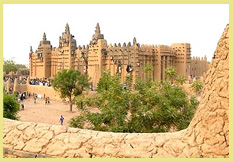




Get Involved
Depending on your situation there are many ways you can help ensure that the ‘crown jewels' of Africa's heritage are protected for the benefit of our generation - and those who follow.
GO! One of the best ways to help is to visit a world heritage site yourself. By doing so, you are demonstrating your interest and solidarity, while bringing your much-needed cash directly to the point where it can have its greatest impact. Most African world heritage sites are managed by self-financing authorities which depend on gate fees and other direct income from visitors. And by supporting local hotels and service providers you are helping develop a ‘conservation constituency' which will be able to challenge other interest groups who may not share our concern for conservation and heritage values.
DONATE! Most African world heritage sites are supported by the international donor community, and depend on donations to maintain on-the-ground management activities. Much of this support comes as official development assistance, provided on a bilateral (i.e. country-to-country) or multilateral basis - from taxpayers in more developed parts of the world. A lot more is voluntary giving to conservation non-governmental organisations/ private voluntary organisations (NGOs/PVOs) - which often play a leading role in managing the sites where their funds are spent.
On the side of official development assistance, the agencies which provide the greatest levels of support to African world heritage sites are the European Union, World Bank, Global Environmental Facility (and French FEM), and USAID. Bilateral support is often focussed on specific sites, for example the German government has provided long-term support to Selous Game Reserve (Tanzania), Kahuzi-Biega National Park (DR Congo) and Tai National Park (Ivory Coast); the Italians have supported Lake Turkana (Kenya) and Whale valley (Egypt); the Austrians, Simien Mountains (Ethiopia); the French, Niokolo-Koba (Senegal). Often, official development assistance is entrusted to international conservation NGOs/PVOs which are operational at the sites concerned. Perhaps surprisingly, the dedicated World Heritage Fund, established under the Convention, offers only small grants. A new African World Heritage Fund has recently been established to channel support specifically to African world heritage sites.
The international conservation NGOs/PVOs depend on donations from people like you to maintain their field activities. Without them, many of Africa's world heritage sites would have suffered catastrophically in recent years. The leading NGOs/PVOs that are actively involved in management of multiple natural world heritage sites across the continent are the World Wide Fund for Nature (WWF) and the Wildlife Conservation Society (WCS). In addition, Conservation International (CI) provides support to a number of sites through its Critical Ecosystems Protection Fund (CEPF), especially in Madagascar; and the African Wildlife Foundation (AWF) has project activities in several sites. Some sites benefit from the long-term dedicated commitment of specific NGOs, foundations or consortia, such as the International Gorilla Conservation Programme (IGCP, which supports Bwindi and Virunga); Frankfurt Zoological Society (FZS, which supports Serengeti and Ngorongoro); FIBA (which manages Banc D'Arguin); Gilman International Conservation (committed to Okapi Faunal Reserve). Local conservation NGOs are active in many places, many of which belong to the Birdlife partnership, or can receive donations directly through Wildlife Direct. While the majority of NGOs provide financial and technical support to the management authority concerned, the African Parks Foundation operates (at Garamba world heritage site, amongst other places) by assuming full management control, under contract, and applying strict business principles to its operations.
JOIN! Keep yourself informed and involved by joining one or more of the organisations mentioned above.
VOLUNTEER! Better still, volunteer to work in support of Africa's world heritage sites. Organise a fund-raising coffee-morning; join a volunteer programme in Africa; work with a local NGO to help clean up litter, carry out wildlife surveys or clear invasive vegetation; plan a university expedition. There are endless possibilities.
COMMUNICATE! Help raise awareness of these fabulous places and their conservation needs. Make sure your voice is heard and your concerns are reflected in the way your taxes are spent, and your representatives' vote on critical issues that impact our most special natural heritage. If you are a member of a conservation organisation, find out what the organisation is doing for world heritage sites in Africa, and make the case to focus on these special places as a priority. And if you visit a world heritage site in Africa, or hear news of a threat to one, share your observations, impressions, suggestions and concerns by writing to the national management authority, or IUCN, or the World Heritage Centre.
.jpg)